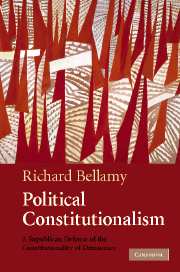Book contents
- Frontmatter
- Contents
- Preface and acknowledgements
- Introduction: legal and political constitutionalism
- PART I Legal constitutionalism
- 1 Constitutional rights and the limits of judicial review
- 2 The rule of law and the rule of persons
- 3 Constitutionalism and democracy
- PART II Political constitutionalism
- Conclusion
- Index
3 - Constitutionalism and democracy
Published online by Cambridge University Press: 22 September 2009
- Frontmatter
- Contents
- Preface and acknowledgements
- Introduction: legal and political constitutionalism
- PART I Legal constitutionalism
- 1 Constitutional rights and the limits of judicial review
- 2 The rule of law and the rule of persons
- 3 Constitutionalism and democracy
- PART II Political constitutionalism
- Conclusion
- Index
Summary
The previous two chapters explored the alleged threat democracy poses to individual rights and the rule of law respectively. In both cases, we saw how far from endangering them, democracy provided much of their underlying rationale and their best defence. However, the very affinity between democracy and these values has prompted a third and, in many respects, the most powerful case for its constitutional limitation: namely, that entrenching certain rights and rules secures the preconditions of democracy itself. On this view, a ‘constitutional democracy’ is a tautology rather than an oxymoron. No tension exists between constitutionalism and democracy since the one merely codifies the underlying norms and procedures of the other. Not even a democratic government could abrogate or infringe such a constitution without abolishing or detracting from democracy itself. Consequently, it is an unconstitutional rather than a constitutional democracy that represents a contradiction in terms.
Though this resolution appears compelling, this chapter shall contend a continuing source of conflict remains. There are many different models of democracy, which define citizenship and the democratic game in a variety of, often incompatible, ways. For democracy to mean ‘people rule’, the demos should be free to redefine the nature of their democracy whenever they want and not be tied to any given definition. After all, we value democracy as giving effect to the status of individuals as autonomous rights-bearers.
- Type
- Chapter
- Information
- Political ConstitutionalismA Republican Defence of the Constitutionality of Democracy, pp. 90 - 142Publisher: Cambridge University PressPrint publication year: 2007
- 7
- Cited by



